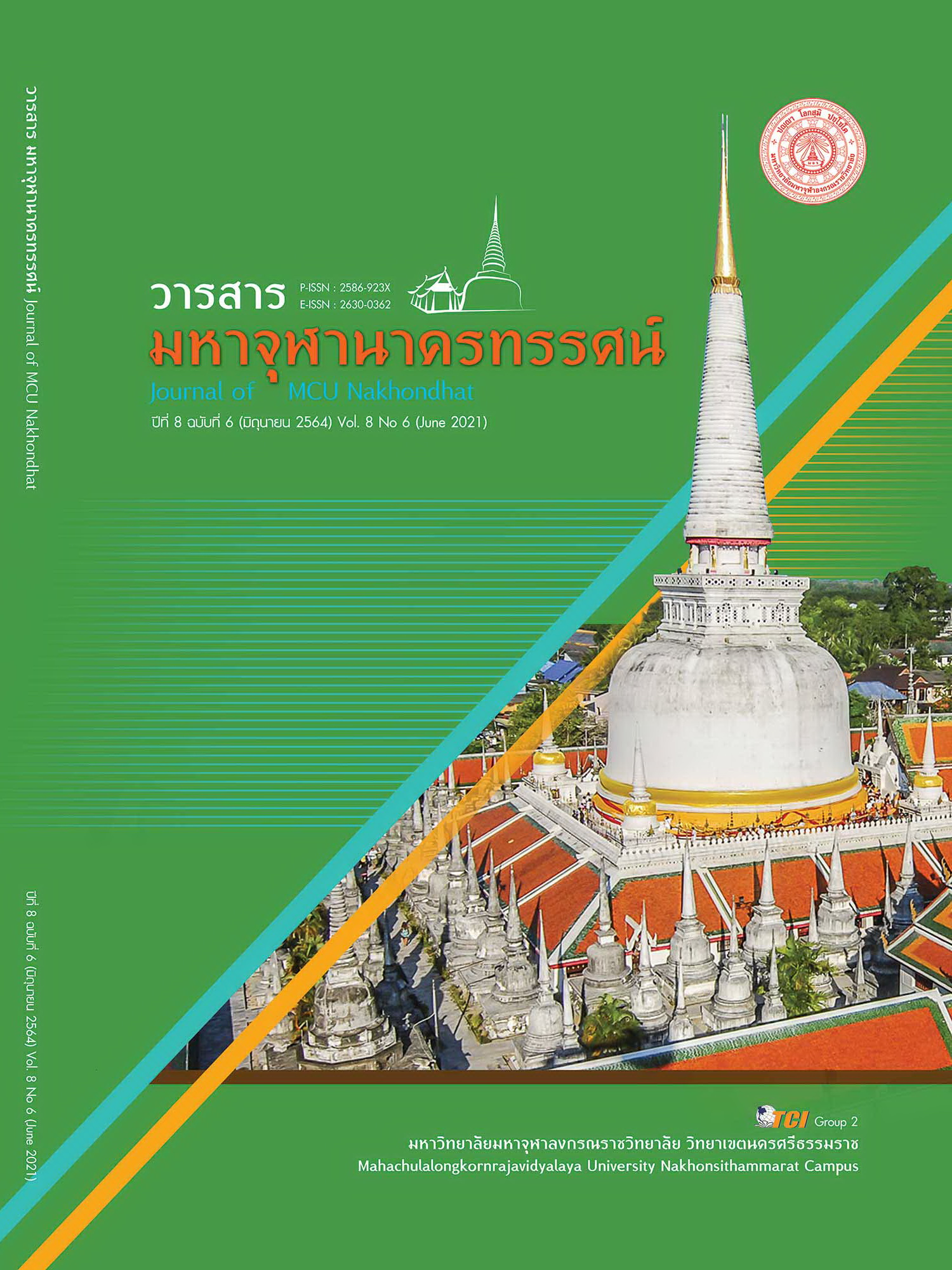PREVENTION OF COVID 19 USING ORGANIC PRINCIPLES
Main Article Content
Abstract
This academic article It is a study of COVID-19 prevention by using organic principles to solve the life problems of people in the disease that spread the COVID 19 according to Buddhism. The Lord Buddha said in a Buddhist proverb that the right views Samatana, all cisterns, cisterns, fights, people who will end their problems and suffer all suffering must follow right views. Or, to concentrate on the 6 organs - eyes, ears, nose, tongue, body, mind - are the principles of the prevention of COVID-19. From the very beginning to the end, there are no problems in living in this COVID-19 situation. Therefore, the prevention of COVID-19 by using organic principles Using the organic principle makes the mind neutral. And have a good commitment Will do any work or adopt it in the prevention of COVID-19 during the high periods Did it for a reason It is accomplished well or helps to be more conscious about the truth. To benefit both oneself and the community Prevention of COVID-19 using organic matter Then we must have a conscious mind Always be prepared and trained by practicing mindfulness. And have basic knowledge and practice on a regular basis. When there is going and where we can use consciousness or organic life. Consider the 6 organics clearly so as not to harm yourself and others. Well-trained organic health is a person who is safe from various dangers. And safe from suffering that would arise from the problem of the ailment.
Article Details
References
พระพรหมคุณาภรณ์ (ป.อ. ปยุตฺโต). (2546). พุทธธรรม (ฉบับปรับปรุงและขยายความ). (พิมพ์ครั้งที่ 11). กรุงเทพมหานคร: โรงพิมพ์มหาจุฬาลงกรณราชวิทยาลัย.
พระมหาเข็มทอง ตนฺติปาโล (ฤทธิ์ลือไกร). (2547). การปฏิบัติวิปัสสนากรรมฐานตามแนวทางของพระครูโพธิสารคุณ (ประยงค์ อุปลวณฺโณ). ใน วิทยานิพนธ์พุทธศาสตรมหาบัณฑิต สาขาวิชาพระพุทธศาสนา. มหาจุฬาลงกรณราชวิทยาลัย.
พระมหาบูรณะ ชาตเมโธ (โพธิ์นอก). (2543). การศึกษาอิทธิพลของอายตนะ (สื่อ) ที่มีต่อการพัฒนาคุณภาพชีวิต. ใน วิทยานิพนธ์พุทธศาสตรมหาบัณฑิต สาขาวิชาการบริหารการศึกษา. มหาจุฬาลงกรณราชวิทยาลัย.
พระโสภณมหาเถระ (มหาสีสยาดอ). (2556). วิปัสสนานัย เล่ม 1. กรุงเทพมหานคร: ประยูรสาส์นไทยการพิมพ์.
มหาจุฬาลงกรณราชวิทยาลัย. (2500). พระไตรปิฎกภาษาบาลี ฉบับมหาจุฬาปิฎก. กรุงเทพมหานคร: โรงพิมพ์มหาจุฬาลงกรณราชวิทยาลัย.
มหาจุฬาลงกรณราชวิทยาลัย. (2539). พระไตรปิฎกภาษาไทย ฉบับมหาจุฬาลงกรณราชวิทยาลัย. กรุงเทพมหานคร: โรงพิมพ์มหาจุฬาลงกรณราชวิทยาลัย.
สามารถ มังสัง. (2563). โควิด 19 ระบาด: เหตุให้เศรษฐกิจและสังคมแย่ลง. เรียกใช้เมื่อ 8 มิถุนายน 2563 จาก https://mgronline.com/daily/detail/9630000059231
สุรชัย โชคครรชิตไชย. (2563). การระบาดของไวรัสโคโรนา (โควิด-19) ในประเทศไทย. เรียกใช้เมื่อ 8 มิถุนายน 2563 จาก https://he01.tci-thaijo.org/index.php/JPMAT/ article/view/242185
อนุตรา รัตน์นราทร. (2563). รายงานผู้ป่วยโรคติดเชื้อไวรัสโคโรนา 2019 (COVID-19): ผู้ป่วยรายแรกของประเทศไทยและนอกประเทศจีน. วารสารสถาบันบำราศนราดูร, 4(2), 116-23.


